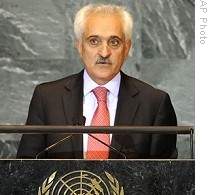United Nations
29 September 2009
Afghanistan's foreign minister told the United Nations General Assembly that his government welcomes the assessment from the U.S. and NATO commander in his country that more troops are needed to fight the Taliban. Meanwhile, as the annual debate continued on Monday, ousted Honduran President Manuel Zelaya addressed delegates by mobile telephone from the Brazilian embassy in Tegucigalpa, where he has taken refuse since last week.
 |
| Afghanistan's Minister of Foreign Affairs Rangin Dadfar Spanta addresses 64th session of UN General Assembly, 28 Sep 2009 |
"Afghanistan fully endorses President Obama's new strategy for Afghanistan and Pakistan, as well as the new assessment by General McChrystal -- particularly their emphasis on the need for a comprehensive and long-term strategy," Spanta said.
President Obama sent an additional 21,000 troops to Afghanistan earlier this year. But General McChrystal has warned that more are needed.
On the contested outcome of last month's presidential election in Afghanistan, Spanta said voting "irregularities" are not unusual in emerging democracies and that the Independent Electoral Commission and the U.N.-supported Election Complaint Commission are working to address the complaints and recount some of the ballots.
Meanwhile, ousted Honduran President Manuel Zelaya addressed the assembly by mobile telephone from the Brazilian Embassy in his country's capital. He is trying to avoid arrest by the interim authorities that overthrew him in a military-backed coup in June. His foreign minister took the podium and held the phone with Mr. Zelaya on the line. He is appealing to the United Nations for help.
"I call on the United Nations, an operation to restore the rule of law and the freedom Hondurans deserve," Zelaya said. "I call on the United Nations to provide support, for the civilized nations of the world to maintain a firm position against barbarity. And I also request the United Nations to give guarantees for our own personal integrity, as well as the lives of the people who are being attacked with chemical gases, with electronic interference at this diplomatic site of the sister Republic of Brazil."
Meanwhile, Cuba's Minister of Foreign Affairs, Bruno Rodriguez, said the Obama administration has done little to improve U.S.-Cuban relations. Although he called the U.S. decision to lift restrictions on Cuban-Americans to visit or send money to relatives in Cuba a "positive step," Rodriguez said it was "insufficient." He said many issues had not been addressed, including the nearly 50-year U.S. imposed embargo of the island nation.
Turning to Asia, Burma's Prime Minister, Thein Sein, said Western economic sanctions against his country are politically motivated and should be lifted. He is heard here through a translator.
"Sanctions are being employed as a political tool against Myanmar and we consider them unjust," he said. "I would like to state that such acts must be stopped."
Burma is also known as Myanmar.
Last week, Secretary of State Hillary Clinton said the United States would pursue direct engagement with Burmese authorities, but that the U.S. would continue to employ sanctions.
Thein Sein is the highest ranking Burmese official to attend the General Assembly in 14 years. He said his country is taking steps toward holding "free and fair elections" next year, but he cautioned that other states should not interfere in Burma's transition to democracy. Many observers are skeptical that those elections will be credible.
And North Korea's Vice Minister of Foreign Affairs, Pak Kil Yon, said his country is not seeking an "arms race," but that it possesses a "dependable nuclear deterrent," which could "possibly prevent war and defend peace." He said Pyongyang would react to "dialogue with dialogue" but warned it would respond to "sanctions by strengthening its nuclear deterrence."